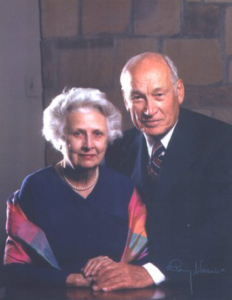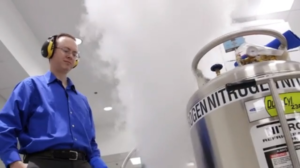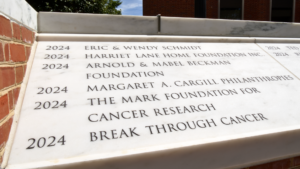Johns Hopkins UniversityEst. 1876
America’s First Research University
According to Doug Barrick, PhD, chair of the Jenkins Department of Biophysics at Johns Hopkins, “Getting funding is one part good ideas, one part good writing, and one part luck.” Too often, traditional avenues of funding are not up to the challenge of taking a risk on a new idea. But visionary scientist Arnold Beckman, PhD, wanted to change this formula, adding in one part Beckman Foundation investment to the equation.

Since its founding in 1977, the Arnold and Mabel Beckman Foundation has provided transformative, unrestricted support to young investigators like Barrick. This funding has given researchers the financial backing and confidence to take risks on innovative projects that have the potential to not only spark a lifelong career, but also completely revitalize the field as a whole. In fact, in many cases, one discovery leads to others across fields and disease areas, increasing impact. And as a world-class inventor, Beckman recognized that revolutionary inventions require breakthroughs not only in instrumentation and methodologies, but in basic scientific understanding.
For Barrick, who is a Beckman Young Investigator awardee, Beckman Foundation support advanced research that has led to insights into how protein molecules fold and bind through the lens of statistical thermodynamics. The basic insights from this research have implications for improving the efficacy of life-saving pharmaceuticals. The research that was seeded with Beckman support has also led to ongoing investigations of how defects in Notch signaling lead to diseases like cancer, illustrating how one big idea can branch out into many other areas and impacts—if given that early support.
Watch the video below to learn about the first and most recent Beckman Young Investigator awardees at Johns Hopkins.
Through programming such as this Beckman Young Investigator award, the Arnold O. Beckman Postdoctoral Fellowship, the Beckman-Argyros Award in Vision Research, and more, the foundation has supported over a dozen novel research projects throughout Johns Hopkins alone—from the Krieger School of Arts and Sciences and Whiting School of Engineering to the Wilmer Institute and Institute for Basic Biomedical Sciences.
Other Johns Hopkins researchers the Beckman Foundation has supported include King Yau, PhD, a Beckman-Argyros awardee whose work on photoreceptors, in which he discovered a specialized cell that used two different cellular mechanisms of signaling the presence of light, at the same time, has furthered our understanding of how humans can sense light. In addition, the Beckman Foundation also supported Yayuan Liu, PhD, and her research on battery degradation, which looks into a process previously unexplored and has huge implications for sustainability.
Liu, who is a current Beckman Young Investigator awardee, states, “This is a very challenging project that I am very passionate about. But when I wrote the proposal to conventional funding sources, the feedback I got was that this is too high risk. So the Beckman Foundation’s funding for these kinds of ‘outside of the box’ brave ideas really helped me jump start this research direction in my lab.”

In addition to fueling early scientists’ explorations, the foundation is also impacting a whole new generation of research through the Beckman Center for Cryo-EM. Located at the School of Medicine and run by James Berger, MD, the facility hosts an array of incredible instruments and equipment that allow researchers from Hopkins and across the region to hone in on tiny particles and specific sections of a cell accurately and efficiently. One recent Beckman Center project explored the structure and function of chromatin, which has implications for drugs targeting many diseases, including cancer.

The Beckman Foundation’s partnership in moving the needle on crucial research is now honored on the Johns Hopkins Founders Wall, a monument on the Homewood campus that celebrates those who have matched Mr. Hopkins’ $7 million estate gift to establish the university. The addition of the Beckman Foundation is a fitting tribute for an organization that, like Mr. Hopkins and his supporters, sees the value of taking a risk on a big idea.
Topics: Foundations, Johns Hopkins Medicine, Research, Krieger School of Arts and Sciences, School of Medicine, Whiting School of Engineering, Wilmer Eye Institute, Fuel Discovery, Promote and Protect Health